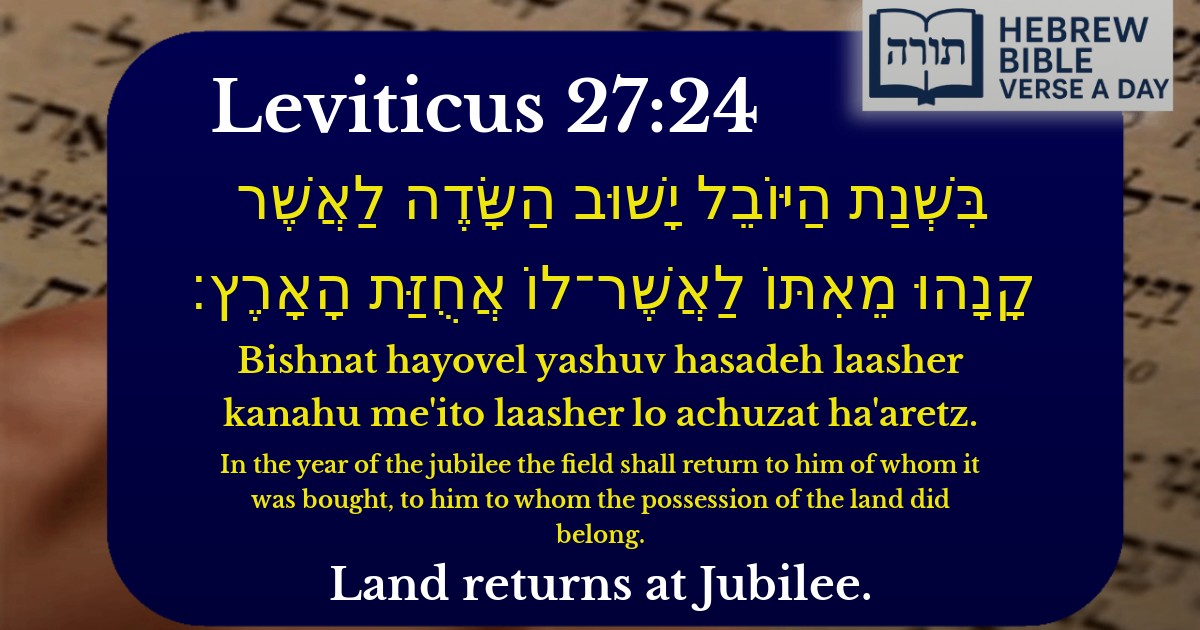Join Our Newsletter To Be Informed When New Videos Are Posted
Join the thousands of fellow Studends who rely on our videos to learn how to read the bible in Hebrew for free!
Hebrew Text
בִּשְׁנַת הַיּוֹבֵל יָשׁוּב הַשָּׂדֶה לַאֲשֶׁר קָנָהוּ מֵאִתּוֹ לַאֲשֶׁר־לוֹ אֲחֻזַּת הָאָרֶץ׃
English Translation
In the year of the jubilee the field shall return to him of whom it was bought, to him to whom the possession of the land did belong.
Transliteration
Bishnat hayovel yashuv hasadeh laasher kanahu me'ito laasher lo achuzat ha'aretz.
Hebrew Leining Text
בִּשְׁנַ֤ת הַיּוֹבֵל֙ יָשׁ֣וּב הַשָּׂדֶ֔ה לַאֲשֶׁ֥ר קָנָ֖הוּ מֵאִתּ֑וֹ לַאֲשֶׁר־ל֖וֹ אֲחֻזַּ֥ת הָאָֽרֶץ׃
בִּשְׁנַ֤ת הַיּוֹבֵל֙ יָשׁ֣וּב הַשָּׂדֶ֔ה לַאֲשֶׁ֥ר קָנָ֖הוּ מֵאִתּ֑וֹ לַאֲשֶׁר־ל֖וֹ אֲחֻזַּ֥ת הָאָֽרֶץ׃
🎵 Listen to leining
Parasha Commentary
📚 Talmud Citations
This verse is quoted in the Talmud.
📖 Arakhin 29b
The verse is discussed in the context of the laws of the Jubilee year, particularly regarding the return of property to its original owner.
📖 Bava Batra 119b
The verse is referenced in a discussion about the laws of land ownership and the Jubilee year.


Verse Context: The Yovel (Jubilee) Year
The verse (Vayikra 25:13) discusses the laws of the Yovel (Jubilee) year, a central mitzvah in the Torah that occurs every 50 years. During Yovel, all ancestral lands sold in the interim return to their original owners, ensuring that tribal inheritances remain intact. This reflects the principle that the Land of Israel is a Divine gift to the Jewish people, and no sale is permanent.
Rashi's Explanation
Rashi (Vayikra 25:13) clarifies that the verse emphasizes the return of land to its original owner without additional payment. Even if the buyer had cultivated the land for decades, the seller reclaims it in Yovel at no cost. This underscores that land in Eretz Yisrael is not truly "sold" but temporarily transferred until Yovel.
Rambam's Legal Perspective
Rambam (Hilchot Shemittah v’Yovel 10:8) explains that this law applies only to ancestral land (achuzah), not to houses in walled cities (which follow different rules, as stated in Vayikra 25:29-30). The return of land in Yovel reinforces the Torah’s vision of economic justice, preventing permanent wealth disparities.
Midrashic Insight
The Midrash (Torat Kohanim 25:13) links this mitzvah to the broader theme of Divine ownership: "The land is Mine, and you are but strangers and sojourners with Me" (Vayikra 25:23). Yovel reminds us that all possessions are temporary, and ultimate ownership belongs to Hashem.
Key Halachic Principles